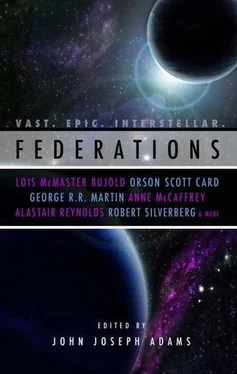I can no longer avoid the risk to myself. I must save my son.
• • •
Amu sits across from Dybathia for another meal. The boy fascinates him. He reminds Amu of himself as a young boy, or what Amu wanted to be—scrappy, irreverent, and intelligent.
Amu serves the two plates himself. Prisoners in the kitchen have prepared a tough pancake-like dish from cultured algae and protein synthesizers. They are trying to develop a pseudo-steak, but they are several years from perfecting it. No matter. Amu is used to it and it is, after all, nutritious. What more can they ask for, with their limited supplies?
“It’s tough. You might need to use your knife to cut it,” he says. Dybathia frowns at the crude knife in his hand, but Amu continues. “It is easy to get mush from the hydroponics tunnels, but we keep striving for something with a firm texture. It’s only been in the last month or two that we’ve been able to have something tough enough to cut.”
Dybathia works at the food on his plate. “I was looking at the knife.” The blunt instrument is barely serviceable.
Amu smiles; it is the “winning” smile he uses when making converts to his various causes. “A holdover from prison life.”
“That was long ago,” Dybathia says.
“Yes, and things have changed now.”
Dybathia lifts an eyebrow.
“We’re here alone, with no non-prisoners for us to worry about. Knives are no longer any threat. And the Warden is nicely contained. But we like to remember what we are and where we are. We manufacture these knives, and they serve the purpose.” Amu lowers his voice. “Maybe if the meat gets a little more meat-like, we’ll need better ones.”
Amu looks across the table at Dybathia. The boy seems fascinated with everything about Bastille, and Amu waits for him to ask the obvious question. But over several days it has not been forthcoming. Finally Amu breaks down and answers it anyway. “I grew up on New Kansas and left my parents, and their religious sect—” he burns inside, thinking of the PEACE converts.
Dybathia smiles. Amu dims the lights, bathing the room in a softer glow. It is storytime.
“New Kansas was a young planet, the soil somewhat unstable. We had planted grassland across entire continents. Wheat, alfalfa and prairie grass, with some used as rangeland for imported animals. But three-quarters of what we grew, the landholders exported offplanet. They were a handful of people who had financed the first colony ships and therefore claimed to own all of New Kansas. We were forbidden to leave our holdings.
“But I had learned how to whip my followers into a frenzy of religious devotion. We fought for our freedom. The colonists had come to New Kansas to start a fresh life. They felt that the Federation owed them at least a chance at autonomy. I knew how to galvanize them.
“They burned their fields. The fires swept across the plains for dozens of kilometers, pouring smoke into the sky that you could see from landholding to landholding. The others rose up.”
Amu speaks with a sense of wonder, paying little attention to the boy. “My people were ready to die for me. Can you imagine that? Holding people so much in the palm of your hand—” Amu extends his fist across the table, opening it so that Dybathia can see the callouses from his hard life—“they were ready to die for me. And we almost succeeded.”
Amu lowers his eyes and pushes his plate away from him. “Almost.”
“I’ve had enough,” Dybathia says. He has eaten most of his pseudo-steak, but Amu stares at the wall, seeing in his memories the visions of burning grass and the bodies of his followers after the landholders had called in Federation reinforcements.
He doesn’t notice as Dybathia stands and slips toward the door. “I’m going to sleep,” the boy says. “I’ll see you in the morning.”
Amu nods and blinks his eyes. But they are filled with water and sting as if from smoke.
• • •
Theowane enters the control center alone. She moves with precise steps, as if stalking. She wants to know what is going on. She will catch the Warden. She will get the information together, and then she will take it to Amu.
The holographic Warden looks at her from his glass-walled cage. His expression remains dubious, fearful, with a layer of contempt. Theowane says nothing as she casually walks over to the panorama window. She gazes across the blasted ground. Though the diggers continue to reform the landscape, she never sees any actual improvement.
Theowane stares for a few moments longer, then turns to meet the Warden’s eyes. “You pride yourself so much in having human emotions and human reactions, Warden, but you’re naive. You don’t know how to hide things from other people. I can read your reactions as clearly as if they were spelled out on a screen.”
The Warden blinks at her. “I do not understand.”
“I caught you yesterday.”
He extends his hands forward until the image fuzzes near the edge of the forcewalls. “What do you mean?”
“The boy,” Theowane says. “You recognized him. It was painfully obvious. You know who he is. You know why he’s here —and it isn’t because of that crazy story he told us. Explain it to me now.”
The Warden hesitates a moment, then hardens his face into a stoic mask. “I don’t know what you are talking about.”
Theowane raises her eyebrows. She reaches out and caresses the control panel. “I can turn the worm loose and delete you.” That doesn’t seem to frighten the Warden; she has used the same threat too many times before.
“Then you will lose whatever information you imagine I have.”
“Perhaps I can find some way to make you feel pain,” she says.
The Warden shrugs. “I am not afraid anymore.”
In all her taunting, Theowane has taught the Warden as much about herself as she has learned from him. He knows exactly how to infuriate her.
“I’ll inform Amu,” she says, trying to regain her composure. “That will stifle whatever plans you are hatching.”
Theowane straightens away from the window and sees the Warden turn his head, flicking his glance to look outside. Sensing something, hearing a muffled sound too close, she whirls around—
The giant automatic digger rears up and plunges through the glass. With its great scooping and digging gears churning, it claws out the poured-stone and insulation, ripping girders and breaching the wall.
Theowane stumbles back, sucking in a breath to scream as the deadly, acid-drenched air of Bastille rushes inside.
• • •
“You’re quiet today,” Amu says as he leads the boy down into one of the lower levels. Smells of oil, dirt, and stale air fill the tunnels.
“Introspective,” Dybathia corrects. He thinks that word will better disarm Amu. He has not thought his silence and uneasiness would be so noticeable, but then he remembers that Amu is a master at studying other people.
“Ah, introspective is it?” Amu’s lips curl in amusement.
“I have been through a lot in the last few days.”
Amu accepts this and continues leading him down to where the corridors widen into larger chambers hewn from the rock. Amu spends hours showing him distillation ponds that remove the alkaloid poisons from the seawater. Like a proud father, Amu demonstrates the rows of plants growing under garish artificial sunlight, piped in and intensified through optical-fiber arrays stretching through the rock to surface collectors.
Other prisoners work at their tasks and seem to move more quickly when Amu watches them. Dybathia wonders how they can consider this to be so different from working under another kind of master.
Amu continues to talk about his grand vision, how they have made their colony self-sufficient. It has been difficult at first without supply ships from the Federation, but they have overcome those obstacles and now have everything they did before—except their prison.
Читать дальше












